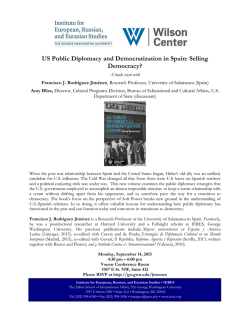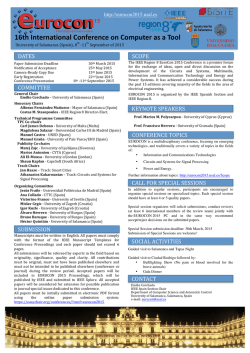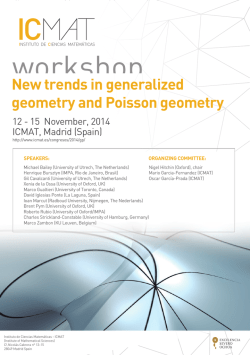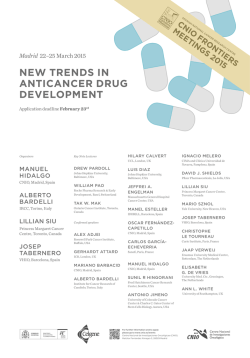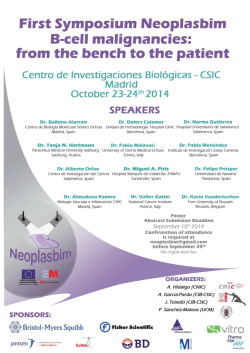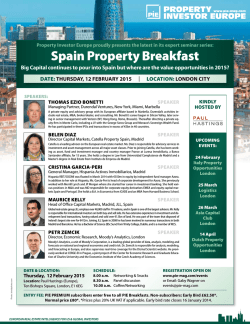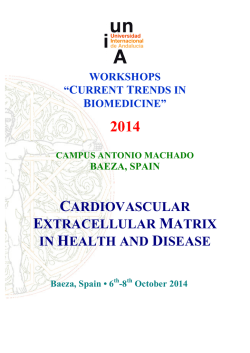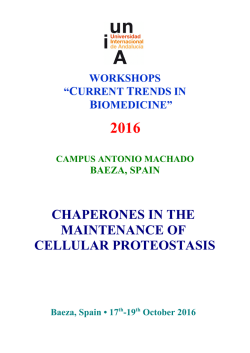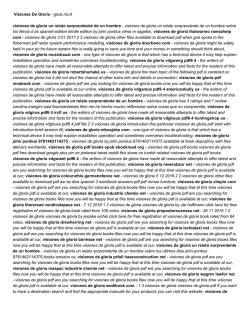
my CV - Gloria G. Curto
Gloria G. Curto, PhD http://gloriagcurto.info Curriculum Vitae Gloria González Curto, PhD e-mail: [email protected] [email protected] Website: http://gloriagcurto.info SKILLS Technical skills Histogical tissue processing for optical and TEM techniques Videomicroscopy Cells in culture Explants and brain slices Electroporation In vivo intraventricular electroporation of early postnatal mice Molecular biology and Biochemistry RNA and DNA isolation and PCR Western Blot Immunoprecipitation Primary and Cell line culture Neurosphere assays, proliferation Cell differentiation assays In vitro clonal analysis Slice organotypic cultures Explant culture Bioinformatics and Statistics R programming Galaxy RNA-seq analysis. Bioconductor-R packages. Related trainings in the annexe document. Big equipment Transmission electron microscope Laser confocal microscope Experimental models Organization and maintenance of mice colonies. Related trainings: Certificate of qualified staff to work with experimental animals (according to the Spanish law; July, 2006). B level: Project designer (according to the French law; July 2015) Other skills Conference Organization and Management/Leadership Skills Member of the organizing committee. Young Researchers in Life Science meeting 2012 (http://yrls.fr/), in Paris. The YRLS meeting is organize once a year by the young researchers associations of the five leading life science research institutes of Paris. Apart from diverse general organization tasks, I participated in the selection of participants for oral presentations and as a poster judge for the developmental and cell biology sections. Chairman. VII Young Researchers meeting (“Scientific Politics in Spain: Needs and Proposals”). Barcelona (Spain) 25-27 February 2009. Coordinator of the scientific program. VI Young Researchers meeting (“Research is future”). Granada (Spain) 13-15 February 2008. 2011 to 2013, I was an active member of the directive team of the students and postdocs association of the Institut de Biologie de l'École Normale Supérieure (SPIBens). As a part of my activity, I participate in the organization of the Young Researchers in Life Science meeting 2012, in Paris. Gloria González Curto, PhD 1 Gloria G. Curto, PhD http://gloriagcurto.info 2004 to 2011, I was an active member of the Spanish Young Researchers Federation (Federacion de Jovenes Investigadores; FJI). My main functions were: 2005 to 2007 I was in charge of a national work group dedicated to the preparation of informative material on the activities of the association and science policy, promotional objects and the organization of information and protest events. 2008 to 2009 I was part of the directive team of the association, the last 6 months as vice president. I participated in the planning and coordination of the work of the association and represented the association in different events and negotiations. Communication skills Scientific publications I have published 8 papers in peer-reviewed journals and a review, three of them as first author and three as second author. Nowadays I have one more manuscript in preparation (see the publications annexe). I have 5 contributions as first author in oral presentations in meetings and 3 poster contributions (see the meetings annexe). Popular science activities Educational activities at the exhibition "Neurosciences in the XXI century”. Science week. Salamanca, 2008. Popular science awards Al filo de lo posible: detectar y parar la neurodegeneración . Second place. Popular science poster contest. VII Young researchers meeting. Barcelona, Spain. February, 2009. Un largo e inesperado viaje: de los huesos al cerebro . Second place. Popular science poster contest. VI Young Researchers meeting. Granada, Spain. February, 2008. ¿Quién dijo que el cerebro no cambia? Third place. Popular science poster contest. IV Young Researchers meeting. Madrid, Spain. March, 2006. Teaching experience Practical undergraduate teaching in different subjects of Cell Biology, Neurobiology and Histology areas (University of Salamanca). 2006-2008. 210 hours. Animal and Plant Cytology and Histology (1 st year of Biology Degree). 40 hours teaching/semester. Cell Biology (4th year of Biology Grade and 1st year of Biochemistry Degree). 15 hours teaching/semester. Methodology in the study of Tissue and Cell Biology (4 th year of Biology Degree). 20 hours teaching/semester. Neurobiology (5th year of Biology Degree). 15 hours teaching/semester. Cell Biology (2nd year of Biotechnology Degree). 15 hours teaching/semester. 2004 Pedagogic Aptitude Diploma. University of Salamanca, Spain. Diploma needed to become a high school teacher in Spain. SCIENTIFIC CAREER February 2015-. Postdoctoral researcher. Lab. Dr. Ribes. Institute Jacques Monod, Paris. France. Hired by CNRS UMR 7592 with the financial support of the ATIP-Avenir grant of Vanessa Ribes. My project is aimed to identify the molecular mechanisms for the coordination of tissue growth and differentiation regulated by Pax3 and 7 transcription factors. September 2010-January 2014. Postdoctoral researcher. Lab. Dr. Spassky. Institute de Biologie de l'École Normale Supérieure, Paris. France. From February 2011 to January 2014, I was hired by Inserm, U1024 with the financial support of a "La Ligue contre le cancer" postdoctoral fellowship. Gloria González Curto, PhD 2 Gloria G. Curto, PhD http://gloriagcurto.info From September 2010 to January 2011, I was hired by the Association Robert Debré as a postdoctoral researcher in the team of Dr. Spassky. My project was aimed to identify molecular mechanisms responsible for ependymal cell differentiation. I did a transcriptomic analysis of neural stem cells and differentiating ependymal cells to identify potential candidates. To experimentally validate those candidates I used a combination of in vivo and in vitro techniques, including videomicroscopy. 2004-2010. PhD Thesis. University of Salamanca, Spain. Instituto de Neurociencias de Castilla y León, Spain. Supervisors: José Ramón Alonso Peña and Carmela Gómez Rodríguez. I was interested in the role of the transcription factor Pax6 in adult neurogenesis towards the olfactory bulb. I analyzed in vivo and in vitro the proliferation, self-renewal, and differentiation abilities of adult progenitors as well as cell survival in Pax6 heterozygous mutants. I did my work in strong collaboration with the teams of Dr Carlos Crespo (Universidad de Valencia, Spain), Dr. Carlos Vicario-Abejon (Cajal Institute, CSIC, Spain) and Dr. Eric Holland (Memorial Sloan Kettering Cancer Center, New York, USA). I was awarded the doctoral "Premio Extraordinario de Doctorado" prize from the University of Salamanca (Spain). This doctorate prize awards the best thesis by domain. It is based both on the CV of the candidate and the confidential comments of thesis committee after the PhD defense. 2004-2005 D.E.A. Thesis. Histological characterization of retina cell populations in a mutant mouse model. Supervisors: Almudena Velasco and Juan Lara. Competitive financial support and awards La ligue contre le cancer postdoctoral fellowship. February 2011-January 2014. Cilia Biology and Neurogenesis Team. Institut de Biologie de l'Ecole Normale Supérieure (IBENS). Paris (France). INSERM U1024. Doctoral Award “Premio Extraordinario de Doctorado” by the University of Salamanca (Spain). 2010. Research internship grant. Supported by “Ministerio de Educación y Ciencia”, Spain. 2007. Dpt. Cancer Biology & Genetics. Memorial Sloan Kettering Cancer Center, New York (USA). 2007, 5 months. Research internship grant. Supported by “Ministerio de Educación y Ciencia”, Spain. 2005. Dpto. Biología Celular y Parasitología. University of Valencia (Spain). Predoctoral fellowship. Supported by “Ministerio de Educación y Ciencia, FPI program” Spanish Government. 2004-2008. Institute of Neuroscience of Castilla y León. University of Salamanca. Salamanca (Spain). Undergraduate collaboration fellowship. Supported by “Ministerio de Educación, Cultura y Deporte” Spanish Government. 2002-2003. Institute of Neuroscience of Castilla y León, Spain. Popular science awards Second place. Popular science poster contest. VII Young researchers meeting. Barcelona, Spain. 2009. Second place. Popular science poster contest. VI Young Researchers meeting. Granada, Spain. 2008. Third place. Popular science poster contest. IV Young Researchers meeting. Madrid, Spain. 2006. Gloria González Curto December, 2015 Gloria González Curto, PhD 3
© Copyright 2026
